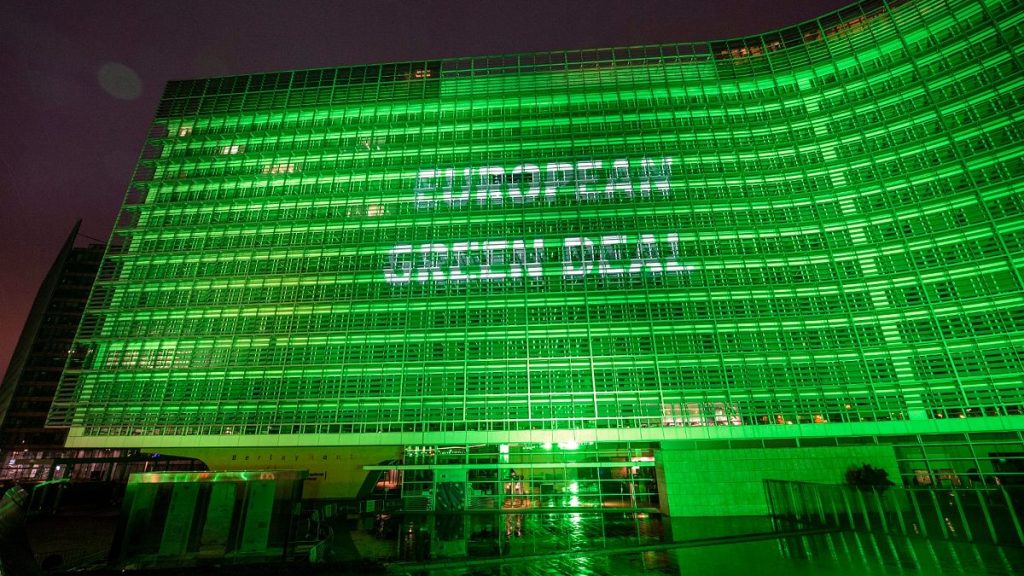In a significant political maneuver within the European Parliament, key lawmakers from the eurosceptic Patriots for Europe (PfE) group are preparing to exploit their newfound authority over a pivotal climate legislation. This move comes after thePfE was confirmed to lead negotiations aimed at a drastic reduction of greenhouse gas emissions by 2040. While the group intends to overhaul EU climate policies, opposition from other party factions, especially from the Greens and centrist lawmakers, may lead to contentious debates over the bloc’s environmental agenda.
| Article Subheadings |
|---|
| 1) The New Power in Climate Policy |
| 2) Reactions from Other Political Groups |
| 3) Calls for Changes to the Green Deal |
| 4) The Legislative Process Ahead |
| 5) The Implications of the Vote |
The New Power in Climate Policy
On Tuesday, the European Parliament confirmed that the Patriots for Europe (PfE) group would lead negotiations on an ambitious new climate target, aiming for a 90% reduction in greenhouse gas emissions by 2040 compared to 1990 levels. This pivotal decision allows the PfE to appoint a rapporteur from its ranks who will help shape the legislative process surrounding this essential environmental policy. This new responsibility was made official as the European Parliament aims to solidify its commitment to tackling climate change, which is a cornerstone of the EU’s environmental strategy.
Reactions from Other Political Groups
The confirmation of the PfE’s authority over the climate file has not gone unnoticed among other political factions within the Parliament. Numerous leftist and centrist Members of the European Parliament (MEPs) have voiced concerns, especially regarding how the far-right Patriots’ influence might impede progress on climate issues. A recent vote saw a proposed emergency procedure, which would have expedited the passage of the climate target, fail with 379 MEPs rejecting it. This failure underscores the contentious nature of climate policy debates in Europe and the challenges that lie ahead.
Calls for Changes to the Green Deal
The PfE has been staunchly critical of the EU’s Green Deal, arguing that it imposes unattainable emission reduction targets that could harm European businesses and citizens. Jordan Bardella, the leader of the National Rally, part of the PfE, previously called for a halt on the Green Deal, raising alarms over what he sees as unnecessary environmental fanaticism. This sentiment resonates with many within the group, pushing for a comprehensive revision of existing policies rather than marginal adjustments.
The Legislative Process Ahead
The legislative work overseen by the appointed rapporteur will involve intricate negotiations as members of the Environment Committee (ENVI) engage in debates surrounding the proposed changes. There remains uncertainty over which MEP will ultimately take on the rapporteur role, but it is expected that an MEP from the National Rally’s contingent will be chosen. The process ahead includes critical discussions that will determine the direction and feasibility of the climate legislation that the PfE aims to influence significantly.
The Implications of the Vote
The recent vote’s outcome is anticipated to create significant ramifications across Europe, especially as the EU gears up for international climate discussions like COP30, set to take place in Brazil. Critics argue that the far-right’s growing clout could complicate negotiations and undermine the EU’s ability to present a unified front on climate issues. One notable concern is the time factor, as several officials, including Silvia Sardone from the Italian League, have indicated that it is unlikely for the proposed changes to be ratified before the November launche of COP30. This further complicates the EU’s credibility in international climate discussions.
| No. | Key Points |
|---|---|
| 1 | The Patriots for Europe group has gained control over key climate legislation in the EU. |
| 2 | Criticism from leftist and centrist groups highlights the growing polarization surrounding climate issues. |
| 3 | The far-right’s agenda may jeopardize existing climate targets and policies. |
| 4 | Debates in the Environment Committee will influence the future of the EU’s climate goals. |
| 5 | Concerns remain over the potential consequences for international climate negotiations. |
Summary
The shift in control over the EU’s climate legislation to the Patriots for Europe group marks a pivotal juncture in the bloc’s environmental policies. As this unfolds, significant opposition from other political factions highlights the growing debate around climate change strategy and the proposed reduction targets. The ramifications of these decisions will extend beyond the parliamentary walls, affecting international climate negotiations and the EU’s global standing in environmental matters.
Frequently Asked Questions
Question: What is the role of the rapporteur in EU legislative processes?
The rapporteur is responsible for preparing reports on specific legislative proposals and guiding discussions within parliamentary committees pertaining to those proposals.
Question: Why do far-right parties oppose the EU’s Green Deal?
Far-right parties, including the PfE, oppose the Green Deal as they view the targets as overly ambitious and detrimental to both European businesses and citizens.
Question: What are the implications of the recent legislative vote?
This vote signifies a shift in power within the EU, with potential risks to climate policies and international negotiations aimed at addressing climate change effectively.


